Acknowledgments
As with any large-scale research project, I am indebted to many individuals whose support, insights, and guidance made this book possible, from its inception to its completion. First and foremost, I am indebted to and inspired by my activist informantsthe communications directors, public relations directors, and presidents and founders of many of the nation's leading gay rights organizations. These are people who work long hours for their cause and their community and yet still gave their time to me. In their offices, in coffee shops, and in gay bars, they shared with me stories of their own coming out, what it was like to see their lives reflected in the media and popular culture, and how their views about marriage changed when they began planning their own commitment ceremonies and weddings. Their perspectives transformed this project and the ways in which I will approach my research in the future.
I am also incredibly appreciative of the careful and attentive work of the anonymous reviewers of this manuscript. The time and attention they devoted to reading, commenting on, and critiquing an earlier version of this book shaped my thinking about this project. Their insights proved invaluable as I continued to refine my arguments. This book would not have been possible without the guidance, feedback, and support of my editor, Danny Nasset, at the University of Illinois Press, and the work of the production team. I am also indebted to my father-in-law, Ray Moscowitz, who put his editorial expertise to work in meticulously fine-line editing each chapter across a period of months. I am grateful for his countless hours of unpaid labor, thoughtful questions, and the journalistic lens he provided my work.
I also want to thank my fantastic colleagues at the College of Charleston, who made it fun to come to work every day. They have created a truly enjoyable and collegial place to work, full of positive energy and encouragement. I am grateful for my department chairs, Brian McGee and Bethany Goodier, who wrote supportive letters and assisted in procuring funding for the project, and for the mentorship of Alison Piepmeier, who helped me navigate through the world of academic publishing.
This book began nearly a decade ago at the Indiana University School of Journalism, and I will forever be indebted to my Dream Team committee, Professors Elizabeth Armstrong, Betsi Grabe, Dave Weaver, and my chair, Radhika Parameswaran. This group of mentors provided me with foundational tools throughout my research trainingthe tools to think, to write, and to ask interesting questions. Most important, they instilled in me a passion for academic work. Their own scholarship guided and inspired this project. They dedicated countless hours to advising, counseling, and meticulously editing drafts. I am endlessly grateful to Radhika, whose belief in the projectand in me as the one to do itmeant I could not waver. I am also indebted to the many other scholars whose work laid the foundation for this project, specifically the work of Edward Alwood, Larry Gross, and Suzanna Walters, to name a few.
I thank the Association for Education in Journalism and Mass Communication (AEJMC) for their continued support of this project, first for recognizing this work as the winner of the Nafziger-White-Salwen Dissertation Award and later as an AEJMC Scholars grant recipient. I knew I had hit the jackpot when Carolyn Kitch agreed to be my mentor for the AEJMC Scholars program; her insights and feedback on my proposal and on chapter drafts helped me take this project to the next level. This work also received financial awards from Indiana University and the College of Charleston. These student and faculty research and development grants made it possible for me to travel and interview activists face-to-face and assisted in the purchasing of videotaped news programs from the Vanderbilt Television News Archive.
As fantastic as the journey is, the process of beginning a new life as an academic comes with a unique set of challenges. In particular, writing a book, at various points in the process, feels self-indulgent, unrealistic, and entirely out of reach. It was the love of friends and family members from all across the country that sustained me. I am indebted to Mary-Tina Vrehas, whose friendship and persistent optimism have been a bedrock of strength for me, and to Tamara Leech, whose balance of scholarship, activism, and parenting is inspirational. I am grateful for the encouragement of colleagues and friendspeople like Andy Billings, April Bisner, Jeff Bennett, Erin Benson, Janis Cakars, Melissa Cakars, Spring Duvall, Suz Enck, Lori Henson, Claire King, Mike Lee, David Parisi, Kristin Swenson, Brynnar Swenson, Darrel Wanzer, Isaac West, the sandwich colleagues at Butler University, and many others.
I am indebted to my parentsmy father, James Stickler, who through his own model ultimately inspired me to be a teacher and an academic, and to my mother, Beverly Mehrlich, whose belief, strength, and tireless counseling provided me the emotional support to see it through. The support of my family members has been a constantpeople like Rick Mehrlich, Christy and Mike Conway, Erica and Chip Gray, and John and Stephanie Stickler. Ray and Barbara Moscowitz provided endless support, encouragement, and, as previously noted, editorial expertise.
Finally, there is nothing that makes you analyze your own relationship like writing a book about marriage. And so I owe the greatest debt to my partner of the last twenty-plus years, David Moscowitz, a man who infuses everything in his lifehis scholarship, his teaching, his children, even his beloved petswith the sort of vitality and optimism that stirs you. He did all the little things to keep me going, whether it was taking the kids to the park, bringing me coffee, or staying up with me into the morning hours so I could finish a chapter.
David also gave me the children I thought I could never have, children who continue to amaze me and frustrate me and delight me throughout this process. My children and this project literally grew together; Amelia (now nearly ten) was a year old when I began to study media coverage of same-sex marriage, and Elijah (now seven) was born soon after the first period of interviews. My project is marked by them, both literally and figuratively. I remember Amelia scribbling on my coding sheets, helping me fill them out, and Eli, scrunched a little too tightly inside my protruding stomach, kicking me incessantly as I interviewed informants. This book is ultimately for Amelia and Eli, in the hope that they will grow up in a culture where they can be who they choose to be and love whom they choose to love.


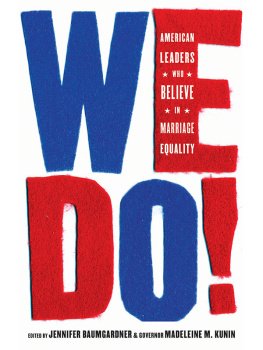
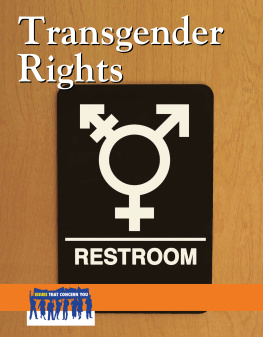
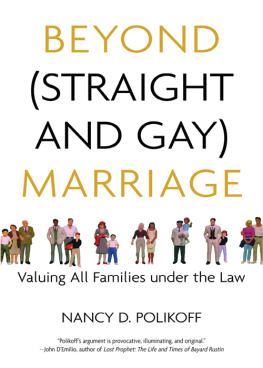
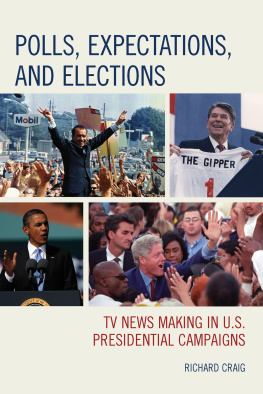
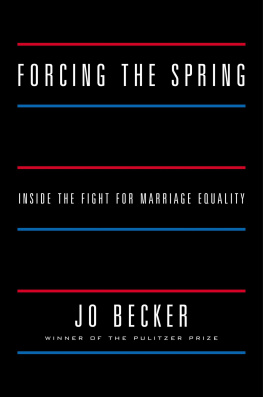

 This book is printed on acid-free paper.
This book is printed on acid-free paper.